- Home
- Rick R. Reed
Dead End Street
Dead End Street Read online
Dead End Street
…Peter’s face warmed with excitement. “We’ll meet at the Tuttle house each week. That’s where we’ll tell our stories.” His smile died as he surveyed the reaction on his friends’ faces.
The group got quiet. Even the music seemed to become softer, as if an unseen hand, pale, veiny, and covered with sores, was turning down the sound.
“The Tuttle house?” Erin whispered, her dark eyes alive with fear.
“Isn’t that where all those murders happened? That family?” Roy’s voice cracked.
“Supposedly,” David spoke up. “That was a long time ago, before any of us were even born. I think it’s just a rotting house up on the hill. Nothing to be scared of.”
“Then we can do it?” Peter sounded hopeful.
“I haven’t got a problem,” David said.
“I don’t know.” Erin twisted a strand of her dark hair. “What if someone catches us?”
“Who’s going to catch us?” Marlene spoke up. “The house is at the end of a dead-end road. There aren’t even any neighbors until you get to the Washington’s, and they’re at least a football field or two away. If we’re quiet, I don’t think anyone would pay any attention. It’s just an empty, old house, really.”
Peter looked around at them all. “‘An empty old house’? Maybe. That’s part of why I want us to meet there. To see just how empty it is. I’ve heard things, lots of things about the Tuttle house. I know you guys have, too.” His gaze met Erin’s, whose unblemished and perfect skin had gone pale. “It may not be as empty as some people’d like to think.” He grinned. “Or hope…”
DEAD END STREET
RICK R. REED
Copyright © 2017 by Rick R. Reed
Cover Art © 2017 The Cover Collection
For Mallory, Brent, Jordyn, Tyler,
Megan, Blake, Silas, Paige, Jacob, and Luke
CHAPTER 1
The Halloween Horror Club
Even if all the horrible things that had happened there had never occurred, the house would still look scary. There were solid things one could point to and say: “That’s what makes this house look forbidding.” Things like the dirty white paint, most of which had cracked and fallen away revealing gray and rotting wood beneath. Windows, little more than empty eye sockets, offered glimpses of the darkness within, their glass panes long ago succumbing to the wiles of vandals. Pine and maple trees grew riotously around the house, closing in on it. The steps leading up to the front porch sagged and looked as if the slightest pressure would crumble them to bits.
The house’s placement, where the woods met the end of Acton Road, gave it a feeling of separateness. As if the house waited at the threshold to the woods, looking for an opportunity to suck in the innocent, to make them disappear into its darkness.
Not many people ventured near the house on Acton Road. Most folks in the Ohio River town of Summitville, Pennsylvania no longer recalled what had occurred in the house fifteen years before. The murders had caused a sensation at the time, but the crimes faded into obscurity, much as the house—once neatly kept and inhabited—faded into rot and disrepair.
* * *
Not everyone in Summitville had forgotten the house. Over the years, groups of teenagers had proven their mettle by entering it, searching for bloody handprints on the walls or the chalk outline of a body. One or two had been brave enough—or foolhardy enough—to wander deeper inside, to test the creaking floorboards. These fearless souls would often run outside, screaming and laughing, and report back to those less courageous who lurked in the shadows. They’d claim to hear a voice telling them to get out, or that they saw a shadow pass along a wall, or simply felt a presence there, watching.
Peter, Marlene, David, Roy, and Erin had more of a mission than to merely cross the threshold of the house to see what was inside. The group of five, all eighth graders who had known each other since they were little, had formed a horror club, and had selected the Tuttle house as their meeting place.
The fact that they would pick the crumbling structure was not surprising. They had grown up in the same neighborhood on the hillside not far from the infamous place. They, too, had heard the stories of weird lights flickering on and off in a structure that had long ago seen the exit of electricity, and the tales of people who had gone inside, never to return. Now, it was time to check out the situation for themselves.
The five friends were prepared for the challenge. After all, this wasn’t their first club. Over the years, they had formed various such organizations among themselves, each one giving the kids an excuse to set up specific times when they knew they would see one another. Maybe more importantly, the meetings gave them something to look forward to.
Peter had been the first to come up with the idea when they were all seven. “How about a Liar’s Club?” he had proposed one August afternoon when the air was thick with humidity and the buzz of flies and cicadas. The others were learning the benefits of falsehood and how a cleverly thought-out fib could save them from trouble with their parents. But the idea of lying just for the sake of lying had an odd appeal, and the group decided to try it. The rules were simple. Each member was required to tell lies to his or her family. Whoever got away with the biggest whopper was the champion.
That club didn’t last long—only part of the summer—probably due to guilt and the group’s limited talents in the field of falsehood.
Other attempts, like a forestry club, various fan clubs, and even a Society for the Advancement of Endangered and Stray Pets (the group’s parents particularly disliked this one), formed and disbanded over the years, accomplishing little more than cementing the friendship among the five. Indeed, the group formed a relationship that weathered the storms of childhood accusations, petty jealousies, and “new” friends whose companionship faded with the passage of time. But one question always remained: could the group continue to come up with new club ideas to further tighten their bond in the months and years ahead?
Late one afternoon in September, not long after school had resumed at East End Junior High, and with Halloween looming on the horizon, the group got together after classes in Erin’s basement. They were clustered around Erin’s desktop computer, surfing the internet, looking for a site where they could download free episodes of Lost when Peter blurted out his latest idea.
“How about a horror club?” He took off his glasses, which everyone except his friends in the group said looked like the bottoms of Coke bottles, and rubbed them on the tail of his green-and-white striped T-shirt while he waited for a response.
The others weren’t having much luck with their internet surfing, and they barely looked up at Peter’s words as they tried to make sense of four million hits on Google after Erin had entered the words, “TV shows online.”
“The only horror is your face,” David finally said, bending over the desktop to adjust the volume of the computer speakers. He grinned, looking over at his friends, who were either sitting on folding chairs by the computer, or standing close to the monitor. The rest of the basement family room was empty. Berber-carpeted floors and an Early American couch that had, in better days, taken up residence in Erin’s parents’ living room, waited for the kids to leave their places by the computer.
Peter walked to the couch and flung a pillow at David, who caught it and flung it back, knocking Peter’s glasses askew. Peter adjusted them and ran his fingers through his dark brown hair. He bit his lower lip. The comment about his face wasn’t amusing, not in the least, especially since that morning Peter had noticed three new zits blooming on his forehead. “Shut up, David. I’m serious.”
Marlene leaned over Erin to press some keys on the keyboard and softened the computer volume. They had stopped searching for TV shows to
pirate and were now listening to an iTunes mix of dance hits from the 1980s—the olden days. “C’mon, David, give Peter a break.” She turned to Peter. “What do you mean? Some sort of club to go see horror movies? We already do that.” Marlene was the quietest of the group, and they all acknowledged she was the smartest, too.
Peter rolled his eyes. “No, I have something a little more imaginative in mind.” He paused and waited until Roy looked away from the computer monitor. Peter bit his lower lip, then continued. “I was thinking of this club as a limited time thing.” He let his statement hang in the air, hoping he was building an appropriate sense of suspense and danger. He hung back from the group gathered around the computer, hands in the pockets of his cargo shorts.
“Yeah. Like the McPig sandwiches at McDonald’s.” David snorted with laughter at his own joke.
“C’mon, Dave. Let him finish.” Roy spoke up, but his words weren’t very convincing. His high-pitched voice made him sound like a seven-year-old boy, or worse, a girl.
“Thanks,” Peter said. “Anyway, what I was thinking was this. It’s only six weeks until Halloween, right?”
Erin nodded and flung a mass of her dark brown hair over one shoulder. She gave Peter the full attention of her eyes, which were so dark they appeared bottomless. Erin was the prettiest of the group, and what made her especially so was the fact that she had no idea this was the case.
Peter continued. “Well, what we could do is meet officially once a week. At that time, one of us would be responsible for making up a scary story—you know, something really gross or bloody—for that week. Let’s see if we can come up with something more terrifying than any movie, something that would make some of us afraid to turn off the lights at bedtime. When we’re all done, we’ll take a vote, and whoever gets the most votes gets to decide how we’ll spend Halloween.”
“Boring!” David said. “Can we move on to other business, like putting some other music on? This sucks.” David reached out toward the computer, and Marlene slapped his hand away.
Her eyes were bright with interest. “I think the idea has potential.”
“I didn’t tell you guys the best part, though.” Peter’s face warmed with excitement. “We’ll meet at the Tuttle house each week. That’s where we’ll tell our stories.” His smile died as he surveyed the reaction on his friends’ faces.
The group got quiet. Even the music seemed to become softer, as if an unseen hand, pale, veiny, and covered with sores, was turning down the sound.
“The Tuttle house?” Erin whispered, her dark eyes alive with fear.
“Isn’t that where all those murders happened? That family?” Roy’s voice cracked.
“Supposedly,” David spoke up. “That was a long time ago, before any of us were even born. I think it’s just a rotting house up on the hill. Nothing to be scared of.”
“Then we can do it?” Peter sounded hopeful.
“I haven’t got a problem,” David said.
“I don’t know.” Erin twisted a strand of her dark hair. “What if someone catches us?”
“Who’s going to catch us?” Marlene spoke up. “The house is at the end of a dead-end road. There aren’t even any neighbors until you get to the Washington’s, and they’re at least a football field or two away. If we’re quiet, I don’t think anyone would pay any attention. It’s just an empty, old house, really.”
Peter looked around at them all. “‘An empty old house’? Maybe. That’s part of why I want us to meet there. To see just how empty it is. I’ve heard things, lots of things about the Tuttle house. I know you guys have, too.” His gaze met Erin’s, whose unblemished and perfect skin had gone pale. “It may not be as empty as some people’d like to think.” He grinned. “Or hope.”
“What are you talking about?” David frowned.
“That’s for you to find out at the first meeting. I’ll tell the story. Next Wednesday after school okay for everybody?”
They all agreed to meet the following Wednesday at the bottom of the hill.
The “Halloween Horror Club” was born.
CHAPTER 2
Peter’s Tale
The following Wednesday brought a sense of loss to the little community nestled along the river. Chill winds following a morning thunderstorm had chased away the warmth and brilliant blue skies of the Indian summer everyone had been enjoying. Overnight, it seemed that even the leaves on the trees, already beginning their course toward fiery colors, had lost interest. Many had dried up, tumbling to roads and sidewalks where they would be chased away by stiff breezes and the wakes of fast-moving cars. The raw wind foretold cold nights and the smell of wood smoke in the air. Low-hanging gray clouds promised more rain; humidity thickened the air.
As Peter labored up the hill toward Acton Road, he shivered in spite of the sheen of sweat coating his forehead. He knew he needed to lose weight, knew he needed to “get a sport,” as his father said. Otherwise, he would end up like his mother—one hundred pounds too heavy and winded by a task as simple as mounting the stairs in their two-story Cape Cod.
Nevertheless, he pushed himself to go faster. He wanted to make sure he was the first to get to the house. After all, the “Halloween Horror Club” was his idea, and if everything was going to go right, it was up to him to make sure things got off to a good start. Peter was very much like Marlene in that he was dead serious about everything he attempted. His story—the first story of the new club—needed to make an impact. It had to be the kind of story his father called “a tough act to follow.”
Peter wiped his forehead with the back of his hand as he finally reached the road running level along the side of the hill. Ahead of him loomed the Tuttle house, making him slow his steps. It looked more run-down and forbidding than ever. Peter was half-tempted to stop and wait for the rest of the group to arrive. He might laugh at the idea if anyone else was around, but the house seemed to be waiting for him. The two-story wood frame structure seemed alive, peering out from the overgrown brambles and the pine and maple trees surrounding it. Against the dark clouds, it possessed an evil, imposing personality.
It almost seemed to breathe.
As he approached the front of the house, Peter gulped, peering up at the broken-out windows, peeling paint, and rotting wood. The house really did look like something out of a horror movie. He flashed on Norman Bate’s house in Psycho. His mom had let him watch that movie late one night. Peter corrected himself. Actually, his mother had fallen asleep and he’d watched the movie all by his lonesome. He’d been afraid to take a shower for weeks afterward. This house had none of the Victorian trappings that famous house did, but there was an odd quality about it that matched the Bates’ house exactly.
But, what was the quality?
It didn’t take long for Peter to identify it. And once he had, he immediately tried to dismiss the thought as a product of his overactive imagination. But it wouldn’t leave. What the two houses had in common was the eerie feeling that someone within was watching.
Peter paused for a moment, panting and again swiping sweat from his brow. He studied the house, looking at each dark opening that had once been a window, searching for movement…a quick flash that would indicate someone was inside. His imagination, he knew, could create a figure moving across one of the upstairs windows or a hand pressed against the dark, broken glass on the first floor.
He decided that if he saw anything, anything at all, he would abandon this “horror club” idea right here. If there was someone in the house, he had no desire to come face to face with whomever—or whatever—occupied the house. At least when he was without his friends around him for reinforcement.
But the windows, almost as if mocking him, remained dark, revealing nothing more than a few dirty scraps of curtains fluttering in the wind.
And then Peter heard something that caused a cold hand to run its scaly fingers up and down his spine. Goosebumps formed along his arms and a cold trickle of sweat ran down his back. From inside the house, Peter
could have sworn he heard a woman’s scream, high pitched and prolonged. It was a wail like he had never heard before, born of terror and pain. Time to turn and run?
As the sound issued forth again, his breath returned to normal. Shaking his head and grinning, Peter realized it was only a gust of wind traveling through the open windows of the old structure.
Calmed, Peter neared the front of the house, searching the ground for artifacts the Tuttles might have left fifteen years before. Perhaps he would find a clue to the murder, long since ignored. Maybe he would even find the murder weapon—the blood-stained knife, now dark and rusty—half buried beneath one of the overgrown yew bushes surrounding the house. He would become a local hero: the sleuth who put the fifteen-year-old mystery to rest.
But the ground held nothing more than broken glass, rusting aluminum cans, and advertising flyers that had caught in the overgrown shrubbery and weeds…weeds that grew so high Peter worried he might step on a snake or a rat. Peter watched very carefully where he placed each foot. He imagined how the bite of a snake or a huge, hairy spider would feel, saw how his ankle would look: bloody and torn, swollen and angry red with poison.
Save the imagination for the stories.
It would soon be time to start the meeting. Peter turned and looked down the road. Roy and Erin were on their way. Peter’s heart seemed to slow when he saw Erin, noticing her dark hair blown back in the breeze, revealing her perfect, pale skin. Her brown eyes, so dark it was hard to find the pupils, seemed almost luminous, even from his distance. Roy, his coarse red hair remaining motionless in the wind, looked like her little brother…a little brother who was not just a few months younger as Roy was, but years younger and in need of the babysitting services Erin offered on the weekends. Indeed, his freckles and the fact that he barely reached Erin’s shoulders in height made him look closer to nine than his real age of thirteen.

 Big Love
Big Love Blue Umbrella Sky
Blue Umbrella Sky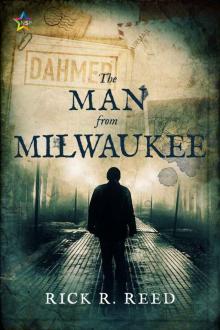 The Man From Milwaukee
The Man From Milwaukee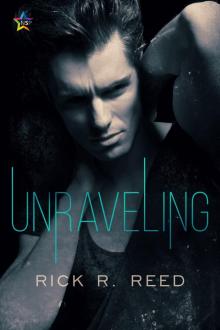 Unraveling
Unraveling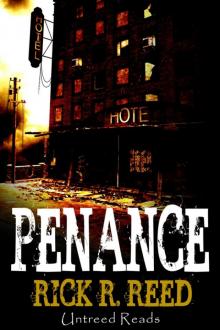 Penance
Penance Husband Hunters
Husband Hunters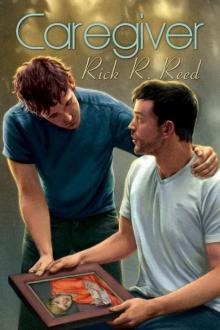 Caregiver
Caregiver Superstar
Superstar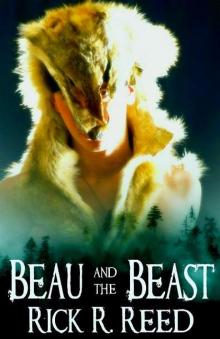 Beau and the Beast
Beau and the Beast Obsessed
Obsessed Bigger Love
Bigger Love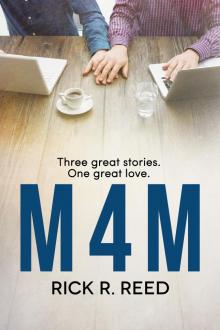 M4M
M4M I Heart Boston Terriers
I Heart Boston Terriers Dinner at Jack's
Dinner at Jack's A Dangerous Game
A Dangerous Game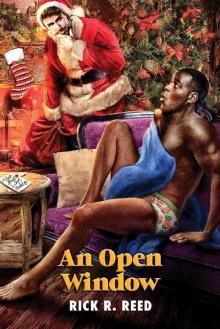 An Open Window
An Open Window Dinner at Fiorello’s
Dinner at Fiorello’s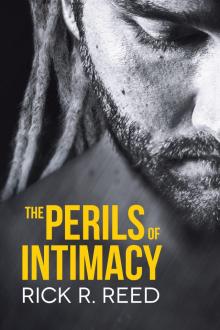 The Perils of Intimacy
The Perils of Intimacy Orientation
Orientation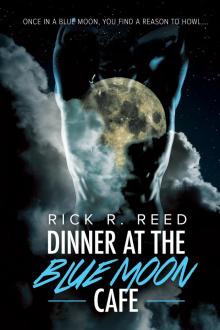 Dinner at the Blue Moon Cafe
Dinner at the Blue Moon Cafe High Risk
High Risk Sky Full of Mysteries
Sky Full of Mysteries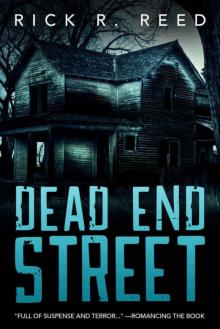 Dead End Street
Dead End Street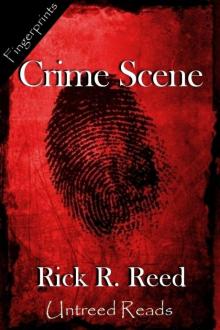 Crime Scene
Crime Scene Fugue
Fugue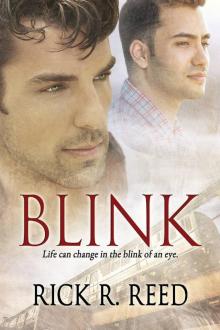 Blink
Blink Lost and Found
Lost and Found